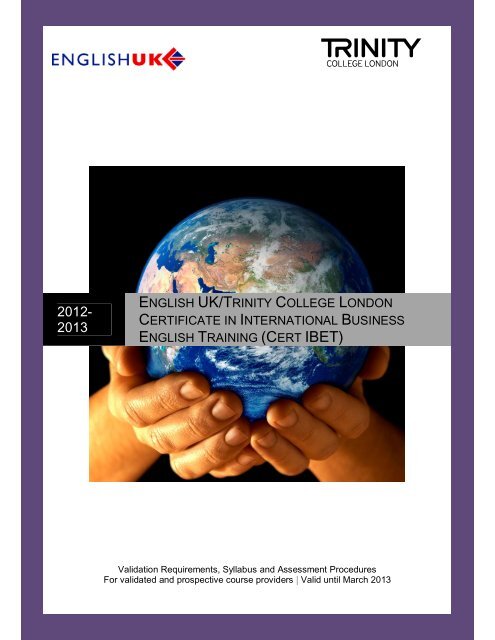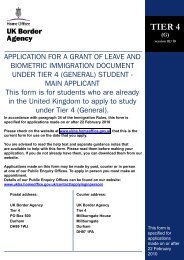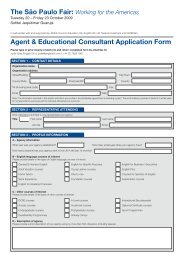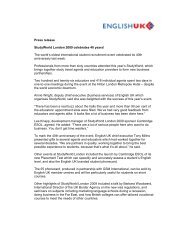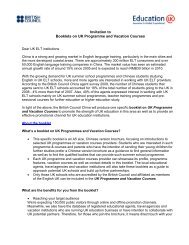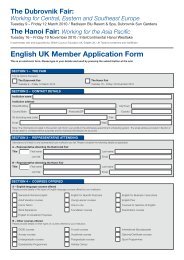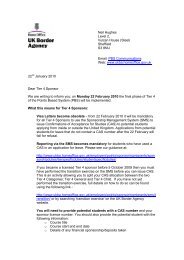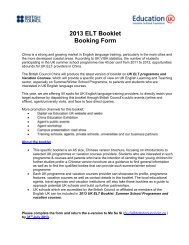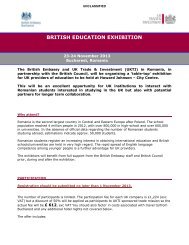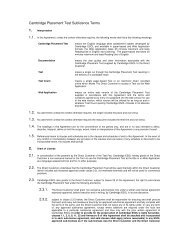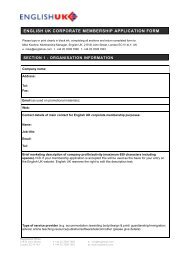cert ibet - English UK
cert ibet - English UK
cert ibet - English UK
You also want an ePaper? Increase the reach of your titles
YUMPU automatically turns print PDFs into web optimized ePapers that Google loves.
2012-<br />
2013<br />
ENGLISH <strong>UK</strong>/TRINITY COLLEGE LONDON<br />
CERTIFICATE IN INTERNATIONAL BUSINESS<br />
ENGLISH TRAINING (CERT IBET)<br />
Validation Requirements, Syllabus and Assessment Procedures<br />
For validated and prospective course providers | Valid until March 2013
<strong>English</strong> <strong>UK</strong> Enterprises Ltd<br />
(Registered company no. 5200973)<br />
Is registered at:<br />
219 St John Street<br />
London<br />
EC1V 4LY<br />
T: +44 (0)20 7608 7960<br />
F: +44 (0)20 7608 7961<br />
E: training@englishuk.com<br />
W: www.englishuk.com<br />
Trinity College London<br />
Is registered at:<br />
89 Albert Embankment<br />
London<br />
SE1 7TP<br />
T: +44 (0)20 7820 6100<br />
F: +44 (0)20 7820 6161<br />
E: info@trinitycollege.co.uk<br />
W: www.trinitycollege.co.uk<br />
The Validation Requirements, Syllabus and Assessment Procedures handbook is<br />
published by <strong>English</strong> <strong>UK</strong> Enterprises, January 2012.<br />
2 Copyright (c) 2012 <strong>English</strong> <strong>UK</strong> Enterprises Limited
Contents<br />
1. Introduction 5<br />
1.1 Background to the Cert IBET 5<br />
1.2 Guiding Principles 5<br />
1.3 The <strong>English</strong> <strong>UK</strong>/Trinity College London Partnership 5<br />
1.4 <strong>English</strong> <strong>UK</strong> 5<br />
1.5 Trinity College London 6<br />
2. Entry Requirements for Candidates 7<br />
2.1 Level of qualification 7<br />
2.2 Entry requirements 7<br />
3. Course Specifications and Syllabus 8<br />
3.1 Aims and objectives 8<br />
3.2 Course delivery options 8<br />
3.3 Course Syllabus 10<br />
4. Assessment Guidelines 12<br />
4.1 Registration of Candidates 12<br />
4.2 Test Item Production 12<br />
4.3 General Guidelines for Assignments 12<br />
4.4 Assignment Titles and Moderator Guidance Notes 13<br />
4.5 Bibliography 17<br />
4.6 Tutorial Support 17<br />
5. Assessment Criteria 18<br />
5.1 Assessment Criteria 18<br />
5.2 Distribution of Grades 18<br />
6. Moderation Procedures 19<br />
6.1 Overview of Moderation Procedures 19<br />
6.2 Internal Assessment (Cert IBET Providers) 19<br />
6.3 External Moderation (Trinity College London) 20<br />
6.4 Deferrals 20<br />
6.5 Results Service and Certification 21<br />
6.6 Referrals 21<br />
7. Validation Overview for Course Providers 22<br />
7.1 The Scrutiny Process 22<br />
7.2 The Application Process 22<br />
7.3 Confirmation or Withholding of Initial Application for Validation 22<br />
7.4 Tenure of Validation 22<br />
7.5 Validation Fees 22<br />
7.6 Validation Requirements for course providers 22<br />
7.9 Review of Status or Termination of Validation by <strong>English</strong> <strong>UK</strong> 25<br />
7.10 Termination of Validation by Provider 25<br />
7.11 Guidelines on Publicity 25<br />
8. Quality Assurance 27<br />
8.1 A Validation Inspection 27<br />
8.2 Optional Visits 27<br />
8.3 Providers’ Meetings 27<br />
8.4 Feedback 27<br />
8.5 Moderations Reports 27<br />
3 Copyright (c) 2012 <strong>English</strong> <strong>UK</strong> Enterprises Limited
8.6 Chief Examiner’s Meeting 27<br />
8.7 Moderation Visit of <strong>English</strong> <strong>UK</strong> 27<br />
9. Appeals and Complaints 28<br />
9.1 Appeals 28<br />
9.2 Complaints 28<br />
10. Useful Contact Information 29<br />
Useful contacts: 29<br />
Appendix B 30<br />
4 Copyright (c) 2012 <strong>English</strong> <strong>UK</strong> Enterprises Limited
1. Introduction<br />
1.1 Background to the Cert IBET<br />
The <strong>English</strong> <strong>UK</strong>/Trinity College London Certificate in International Business <strong>English</strong> Training<br />
(Cert IBET) was launched in 2008. The qualification was developed in recognition that<br />
specialised ELT teaching is becoming an increasingly important part of the ELT profession.<br />
The qualification is also a response to a global need for lifelong learning and a need among<br />
business <strong>English</strong> teachers to further their development after gaining an initial ELT teaching<br />
qualification.<br />
The Cert IBET is the first truly international qualification for practising business <strong>English</strong><br />
trainers and presents candidates with the opportunity to enhance their skills and expertise in<br />
the delivery of Business <strong>English</strong> courses and improves their employability in the sector and<br />
their credibility with potential clients.<br />
1.2 Guiding Principles<br />
This qualification’s development is underpinned by the following principles; accessibility,<br />
efficiency, a focus on quality, rigour, procedural simplicity, cost-effectiveness and social<br />
responsibility.<br />
All of the processes are conducted electronically to reduce paper wastage, to exploit<br />
technological advances and to speed up the processing time for assignments. The course<br />
validation, assessment and moderation procedures are rigorous and detailed but not<br />
excessively bureaucratic and flexibility is built into the programme to allow centres to<br />
differentiate their courses to the individual needs of their candidates.<br />
1.3 The <strong>English</strong> <strong>UK</strong>/Trinity College London Partnership<br />
The Cert IBET qualification has been developed through a partnership between <strong>English</strong> <strong>UK</strong><br />
and Trinity College London. <strong>English</strong> <strong>UK</strong> owns the rights to the qualification itself and validates<br />
course providers as well as providing day-to-day administrative support. Trinity owns the<br />
moderation process and moderates the assignment assessment process.<br />
1.4 <strong>English</strong> <strong>UK</strong><br />
<strong>English</strong> <strong>UK</strong> is the <strong>UK</strong>’s national association for accredited <strong>English</strong> language centres. Formed<br />
in 2004 from two previous associations (ARELS and BASELT), the association has over 445<br />
member centres including private schools, educational trusts and charities, further education<br />
colleges and universities.<br />
All <strong>English</strong> <strong>UK</strong> members must first be accredited under the Accreditation <strong>UK</strong> Scheme which is<br />
run in partnership with the British Council. The key role of the organization is to promote a<br />
quality in course delivery and service, to represent the interests of the membership and to<br />
ensure that students can fully benefit and enjoy an enriched educational experience while in<br />
the <strong>UK</strong>.<br />
<strong>English</strong> <strong>UK</strong>’s core activities on behalf of its members include: lobbying and representation at<br />
senior governmental levels, facilitating trade through marketing and promotional activities,<br />
business development support, and professional development. <strong>English</strong> <strong>UK</strong> also organizes the<br />
prestigious annual StudyWorld Fair.<br />
5 Copyright (c) 2012 <strong>English</strong> <strong>UK</strong> Enterprises Limited
In addition to the Cert IBET qualification <strong>English</strong> <strong>UK</strong> offers the DELTM (Diploma in ELT<br />
Management), the WOCC (Welfare Officers’ Certificate Course) and hosts a series of<br />
conferences specifically for teachers, business <strong>English</strong> trainers and ELT managers.<br />
1.5 Trinity College London<br />
Trinity College London’s training qualifications in TESOL have been established for four<br />
decades. The training has developed in range and complexity since the 1960’s when the<br />
number of students coming to the <strong>UK</strong> to study <strong>English</strong> started to increase significantly.<br />
TESOL now provides many thousands of people in almost every region of the world with a<br />
career that combines academic study, teaching and teacher management, and continuous<br />
association with other cultures.<br />
Trinity qualifications are recognised as professionally sound and well-regulated benchmarks<br />
of performance by major employers worldwide. Trinity pioneered the concept of graded<br />
examinations in music in 1877, set its first speech examination in 1918 and now conducts<br />
ESOL examinations throughout the world. Trinity is the only board in the <strong>UK</strong> to provide<br />
learner assessments and higher vocational qualifications across the full range of the<br />
communicative and performing arts including TESOL, <strong>English</strong> language (ESOL) speech,<br />
acting, drama, dance and music.<br />
6 Copyright (c) 2012 <strong>English</strong> <strong>UK</strong> Enterprises Limited
2. Entry Requirements for Candidates<br />
2.1 Level of qualification<br />
The Cert IBET is a qualification for ELT/TESOL Certificate qualified teachers who wish to<br />
further enhance their skills and expertise in the delivery of Business <strong>English</strong> courses. The<br />
Cert IBET will not only give candidates a thorough grounding in the concepts underpinning<br />
this field, but will also improve their confidence and competence in the planning and delivery<br />
of Business <strong>English</strong> courses.<br />
Cert IBET courses are suitable both for teachers who have limited experience of teaching<br />
business <strong>English</strong> and for teachers who have more experience in the sector. The aim of the<br />
course is not to provide training in how to teach professionals to do business or their job but<br />
to be able to provide end users with the language and communication strategies and skills to<br />
help them to do their jobs more effectively.<br />
The qualification will considerably enhance teachers’ employment opportunities and will<br />
increase their chances of winning new clients. International companies and quality language<br />
providers prefer to work with training professionals who hold relevant, high quality and<br />
recognised qualifications with an international currency.<br />
2.2 Entry requirements<br />
Essential requirements<br />
· Candidates must hold an initial ELT teaching <strong>cert</strong>ificate in ELT/TESOL e.g. Trinity<br />
Cert TESOL, Cambridge RSA CTEFLA/CELTA or an equivalent qualification that can<br />
be demonstrated to meet the following criteria: at least 100 hours of TEFL/TESOL<br />
input, at least six hours of observed teaching practice, and external validation from a<br />
reputable awarding body (normally a university or recognised examination board) or<br />
have a minimum of three year’s full time <strong>English</strong> Language Teaching experience<br />
constituting a minimum of 15 hours per week over a 32 week period<br />
· Candidates must also be able to demonstrate proficiency in <strong>English</strong> either through<br />
holding a recognized qualification or by demonstrating equivalence to CEFR C1<br />
(Common European Framework). Acceptable equivalents would include: Trinity ISE<br />
Grade III; Trinity Graded examination in Spoken <strong>English</strong> Grade 10 or above;<br />
Cambridge ESOL Certificate in Advanced <strong>English</strong>; Cambridge ESOL Certificate of<br />
Proficiency in <strong>English</strong>; IELTS band 7.0 or above on all sub-skills; TOEFL score 627 or<br />
above (paper-based), 263 or above (computer-based) or 107 9internet-based)<br />
Desirable requirements<br />
· Candidates ideally will have at least one year’s ELT/TESOL practical teaching<br />
experience constituting a minimum of 15 hours per week over a 32-week period.<br />
· Previous experience of around 40 hours of teaching business <strong>English</strong> with common<br />
business terminology, concepts and skills would be advantageous.<br />
· Significant experience of working in a middle management role in business would<br />
also be regarded as advantageous.<br />
7 Copyright (c) 2012 <strong>English</strong> <strong>UK</strong> Enterprises Limited
3. Course Specifications and Syllabus<br />
3.1 Aims and objectives<br />
The Cert IBET qualification aims to equip business <strong>English</strong> trainers with the essential skills<br />
and knowledge in this branch of ESP teaching and encourage candidates to develop further<br />
professionally in this area. The aims and objectives of this qualification are as follows:<br />
· To build the confidence, knowledge and understanding of teachers seeking to further<br />
their career in business <strong>English</strong> training<br />
· To understand, identify and respond effectively to the communication and language<br />
needs of learners and organisations<br />
· To develop and deliver programmes that produce effective and measurable outcomes<br />
in addressing the communication and language needs of learners and organisations<br />
· To select, employ and evaluate a range of methods, approaches, materials,<br />
resources and techniques appropriate to varied business <strong>English</strong> contexts<br />
· To deepen understanding of the changing nature of international communication and<br />
enhance their opportunity to participate effectively in the global workplace<br />
· To develop familiarity with the concepts, skills, lexis and discourse of business and<br />
professional <strong>English</strong><br />
3.2 Course delivery options<br />
Introduction<br />
The course is run over a minimum of 50 hours spread over at least 8 full days. Additional<br />
hours may be prescribed at the discretion of the course provider and course participants. The<br />
balance of the 50 hours of core course content can be distributed between the 11 modules at<br />
the discretion of the local provider to match the strengths and interests of that centre and the<br />
needs of the participants.<br />
Variable Course Delivery Mechanisms<br />
A varied and flexible course delivery mechanism is important for the learner. This is especially<br />
relevant for teachers who often cannot take time off to attend an extended course. We<br />
therefore recommend that some providers offer programmes that combine face-to-face with<br />
online delivery. Please note that although the course provider may develop a variety of<br />
delivery models, the course must be delivered over a minimum of 8 full days.<br />
Below is a table showing a range of different delivery mechanisms and offering advice on the<br />
advantages and disadvantages of each. Centres are free to run courses in a format that<br />
works for their market.<br />
DELIVERY MECHANISM ADVANTAGES CONSIDERATIONS<br />
50 hours intensive over<br />
face-to-face delivery over 8<br />
days (NB. 8 days is the<br />
minimum course<br />
specification)<br />
Whole course delivered in<br />
one go – easy to organize<br />
and administer<br />
Group can be cohesive and<br />
dynamic<br />
Can be offered during<br />
summer or Easter teaching<br />
breaks<br />
Can be difficult for teachers<br />
to take time off<br />
If centre not local there will<br />
be additional<br />
accommodation costs<br />
Too intense – not enough<br />
time to absorb learning<br />
Need to limit numbers<br />
50 hours over 2 weeks (10<br />
days)<br />
Is a more realistic format –<br />
allows 5 contact hours per<br />
day with a weekend break in<br />
8 Copyright (c) 2012 <strong>English</strong> <strong>UK</strong> Enterprises Limited<br />
May cost more to run
Part time evening over the<br />
course of an academic year<br />
Weekend blocks x 4<br />
delivered over consecutive<br />
weekends of one weekend<br />
per month<br />
Online/distance learning*<br />
Distance learning plus faceto-face<br />
One-to-one intensive<br />
programme<br />
between<br />
Fits in more easily to<br />
teaching schedule<br />
Allows learning to be<br />
absorbed and integrated into<br />
what the teacher is doing at<br />
work (similar to a part time<br />
Dip TESOL)<br />
Allows centres to free up time<br />
in day<br />
Allows for learning to be<br />
absorbed whilst still retaining<br />
intensity<br />
Allows centre to be used at a<br />
weekend so frees up the<br />
week for other courses<br />
Doesn’t clash with teacher’s<br />
work schedules<br />
Could work well with local<br />
contingents<br />
Enables teachers to learn in<br />
their own time and pace<br />
Can run with multiple<br />
numbers or no limit on<br />
numbers<br />
Potentially more candidate<br />
numbers<br />
Blended model might work<br />
well for busy teachers<br />
Flexible and accessible –<br />
there may be an expectation<br />
for Cert IBET to be run in this<br />
way<br />
Potentially greater candidate<br />
numbers<br />
Allows programme to be<br />
tailored precisely to the<br />
participant’s need<br />
Can lose momentum and<br />
take too long<br />
A little too “conventional”<br />
Can be problematic if<br />
teachers are traveling from<br />
abroad<br />
May be difficult for teachers<br />
with families<br />
May require more support<br />
and control from awarding<br />
body<br />
Centre would need to<br />
provide comprehensive<br />
learning packs<br />
Would need plenty of direct<br />
tutorial time<br />
May require more support<br />
and control from awarding<br />
body<br />
Requires more effort on<br />
behalf of centre<br />
Potentially not cost-effective<br />
Very intense<br />
Labour intensive<br />
9 Copyright (c) 2012 <strong>English</strong> <strong>UK</strong> Enterprises Limited
*ICT-Based Delivery Mechanisms<br />
For purely online delivery we would strongly recommend providing additional course content.<br />
The provider will need to demonstrate rigorous systems for ensuring the effective support of<br />
course participants from a distance. Support may include but would not be limited to: regular<br />
tutorial sessions, online interaction with other course participants and direct and indirect<br />
supervision and monitoring. The level of tutorial and administrative support from the provider<br />
of an online course should be roughly equivalent to what would be expected for a face-to-face<br />
course.<br />
Virtual learning environment (VLE)<br />
It is expected that all courses will be supported by the creation of a VLE. The most common<br />
form of VLE is Moodle, a free open source course management system (CMS). This system<br />
acts as a virtual online community and contains downloadable support materials and notice<br />
boards for trainees and trainers to navigate and interact.<br />
http://moodle.org/<br />
3.3 Course Syllabus<br />
Core Course Syllabus Requirements<br />
The Cert IBET course must include a minimum of 50 hours of input. The following 11 modules<br />
constitute the core syllabus requirements.<br />
What is Business <strong>English</strong>?<br />
Concepts and language in a<br />
business context<br />
Needs analysis and<br />
research<br />
Materials and resources<br />
Internationalism and culture<br />
Business <strong>English</strong> v General <strong>English</strong><br />
Business settings and contexts<br />
Current and historic trends in Professional <strong>English</strong> training<br />
Motivation and needs of business learners<br />
Characteristics and expectations of business learners<br />
<strong>English</strong> for Specific Purposes<br />
Financial, marketing, management and HR concepts and<br />
terminology<br />
General business <strong>English</strong>: grammar and lexis<br />
Current trends in business and management<br />
Familiarisation with business technologies (teleconferencing,<br />
e-commerce, etc.)<br />
Strategies for expanding business-world knowledge<br />
Needs analysis and learner profiling of learners’<br />
communication and language needs<br />
Identification of the communication purpose and language<br />
needs of the company<br />
Target situation analysis and analysing the whole<br />
communication scenario<br />
Content negotiation<br />
Techniques for researching companies, industries and<br />
sectors<br />
Published materials and course-books<br />
Authentic materials<br />
Self-designed and supplementary materials<br />
Learner as a resource<br />
Web-based resources<br />
Technology - Visual (DVD, Interactive whiteboards, etc.),<br />
Audio (Podcasting)<br />
Virtual Learning Environments (Moodle, etc.)<br />
Copyright issues<br />
Globalisation of world trade<br />
Localised educational contexts and learning styles <strong>English</strong><br />
as a Lingua Franca/<strong>English</strong> as an International Language<br />
10 Copyright (c) 2012 <strong>English</strong> <strong>UK</strong> Enterprises Limited
Course and syllabus design<br />
Methods, approaches and<br />
techniques<br />
Business communication<br />
skills development<br />
(oral/aural)<br />
Business communication<br />
skills development (reading<br />
and writing)<br />
Evaluation and assessment<br />
Professional development<br />
and employment<br />
Understanding culture<br />
Cross-cultural awareness and training<br />
Interpreting needs analyses to set learning and training goals<br />
Course and syllabus design<br />
Working with the Common European Framework for<br />
Reference (CEFR)<br />
Developing schemes of work<br />
Lesson planning<br />
Timetabling<br />
Delivery modes (inc. distance, e-learning, blended)<br />
Virtual learning support systems for distance learner support<br />
Course types (1 to 1, small group, in-company, low level,<br />
advanced, executives)<br />
Lexical, discovery and task-based approaches<br />
Simulations, role play, and case studies<br />
Learner autonomy and learning to learn skills<br />
Presentations<br />
Negotiations<br />
Telephoning and teleconferencing<br />
Interviewing<br />
Meetings<br />
Socialising<br />
Travel<br />
Report writing<br />
Charts, graphs, financial and statistical data<br />
Letters, memo’s, email and the Internet<br />
Journals and magazines<br />
Diagnostic, formative and summative assessment<br />
Evaluating and measuring programme objectives<br />
Giving tutorials and feedback to learners<br />
Managing feedback and course expectations to HR<br />
managers<br />
Public Business <strong>English</strong> examinations<br />
Working with HR departments<br />
Making a pitch to a company<br />
Developing your CV and portfolio<br />
Further qualifications and CPD activities<br />
Membership organisations (BE<strong>UK</strong>, BESIG, etc.)<br />
Sources for further reading<br />
Pre-course tasks<br />
To fully maximize the face-to-face delivery time we would recommend developing a precourse<br />
pack to enable the trainee to be able to start their course in advance of the attendance<br />
or online phase. The “Concepts and language in a business context” module would ideally<br />
lend itself to such a pre-course format.<br />
11 Copyright (c) 2012 <strong>English</strong> <strong>UK</strong> Enterprises Limited
4. Assessment Guidelines<br />
4.1 Registration of Candidates<br />
· To register for the Cert IBET applicants must first demonstrate that they meet the<br />
entry requirements for the course. They will need to submit original or <strong>cert</strong>ified copies<br />
of their ELT qualifications and provide evidence (e.g. via a reference) for any claimed<br />
teaching experience.<br />
· They should then fill in an application form and submit the relevant fee to the course<br />
provider.<br />
· All Cert IBET registration fees should be collected before the course has started and<br />
remitted to <strong>English</strong> <strong>UK</strong> on or before the first day of the commencement of the course.<br />
Course providers must cover any charges.<br />
· While there is no obligation for course participants to register for the Cert IBET<br />
qualification any local course <strong>cert</strong>ification must not contain any reference to the Cert<br />
IBET. It must also be stressed that by not taking the assignment stage the candidate<br />
will be forfeiting the opportunity to gain a valued and well-respected international<br />
qualification.<br />
4.2 Test Item Production<br />
· A panel of test item writers meets once a year normally in the autumn to set the<br />
assignment titles for Cert IBET assignments.<br />
· The panel comprises of a senior representative from <strong>English</strong> <strong>UK</strong>, Trinity, and up to<br />
two industry experts. Providers are also encouraged to provide feedback on test<br />
items and submit suggestions and ideas for future assignment titles.<br />
4.3 General Guidelines for Assignments<br />
· The total word count for all assignment rubrics is 3000 – 4000 words excluding<br />
appendices<br />
· Assignments that are not within these word limits will not be moderated<br />
· Assignments should be submitted as ONE word document for the main body of the<br />
text and ONE further pdf document containing all appendices ordered consecutively.<br />
Full details on submitting assignments for moderation are available in the separate<br />
‘Moderation Guidelines’ document<br />
· Candidates must choose only one of the four titles and cannot alter the rubrics<br />
· Moderators have only limited time to sample appendices and as far as possible the<br />
complete question should be answered in the main body of the text<br />
· Appendices should typically include: samples of published materials; supporting<br />
materials such as needs analysis, examples of learner work and learner feedback;<br />
tables and charts; detailed schemes of work if required<br />
· All appendices should be referred to in the main body of the text<br />
· Samples of published and self-created or adapted materials need to be scanned and<br />
included in the appendices as well as being appropriately referred to in the main body<br />
of the text. These materials should relate clearly to the assignment content and<br />
should be a representative sample only<br />
· Assignments must include a cover page with the complete rubric as stated below,<br />
the total word count excluding appendices, the full name of the candidate, the name<br />
of the course provider, the dates of the IBET course and the date of submission. Do<br />
not include this cover page in the assignment word count<br />
· All cited materials need to be appropriately referenced. If you submit photocopied<br />
resources, these should be clearly referenced on the page(s) itself. A consistent<br />
referencing system, such as the Harvard system, should be used throughout. Trinity<br />
guidelines on referencing are available online or from your provider<br />
· The main text should be single-spaced and written in 12 point using the Times New<br />
Roman or Arial fonts<br />
12 Copyright (c) 2012 <strong>English</strong> <strong>UK</strong> Enterprises Limited
· All assignments require a profile of a group or individual learner. This profile<br />
may be based on an actual group or individual or a hypothetical one<br />
· Providers are required to send a cover sheet affirming that to the best of their<br />
knowledge the work is the candidate’s own. Assignments containing plagiarized text<br />
will not be moderated and the candidate might not be permitted to make further<br />
submissions<br />
· Providers should structure their Cert IBET programmes so that all the questions can<br />
be confidently answered by their trainees. Centres should not influence the trainees’<br />
choice of question.<br />
4.4 Assignment Titles and Moderator Guidance Notes<br />
<strong>English</strong> <strong>UK</strong> and Trinity normally release three assignment titles every one to two years and<br />
candidates must respond to one of the set assignment titles. Titles come into effect from 1 st<br />
January each year. The three assignment titles for 2010 are listed below:<br />
Question One<br />
i) Provide a profile of an individual business <strong>English</strong> learner or group of at a<br />
level with which you are familiar.<br />
ii) Design a 30 hour scheme of work for this group or individual<br />
iii) Provide a rationale for your scheme of work<br />
Assessor/moderator guidance notes<br />
· The profile should include the following information as a minimum: language<br />
background; current level across the four skills; business background(s) and<br />
experience; motivation for study; objectives and targets; time available for study;<br />
intensive or extensive programme; location; method(s) of delivery; resources<br />
available; identification of core needs; individual needs within a group; awareness<br />
of different learning styles<br />
· The 30 hour scheme of work should be in outline only. It should include as a<br />
minimum: relevant business skills; areas of language to be covered; material<br />
sources; timings of sessions; formative and summative assessments; self-study;<br />
programme objectives; mode(s) of delivery. A more detailed version of this<br />
scheme of work can be included in the appendices if necessary.<br />
· The rationale must focus on: how identified core needs are met by the scheme of<br />
work; the appropriacy and relevance of skills and language work; appropriate<br />
criteria for selecting materials, activities, methods, approaches and techniques;<br />
the focus on individual needs within a group and the learners’ different learning<br />
styles; an explanation of course weightings and timings; the sequencing of core<br />
elements; the flexibility of the programme; the anticipation and resolution of<br />
problems; a rationale for the means of assessment.<br />
· Schemes of work should be in the main body of the text for ease of reference,<br />
rather than in the appendices, and are included in the total word count.<br />
13 Copyright (c) 2012 <strong>English</strong> <strong>UK</strong> Enterprises Limited
Question Two<br />
i) Select, adapt and/or develop a set of materials for a six hour segment of a<br />
business <strong>English</strong> programme. Relate your materials to an individual<br />
business <strong>English</strong> learner or group at a level of your choice<br />
ii) Provide an outline lesson plan for the six hours indicating the language<br />
focus, skills and/or purposes that the materials will support<br />
iii) Provide a rationale for your choice of materials and their exploitation<br />
Assessor/Moderator Guidance Notes<br />
· Materials can be based upon published materials or be authentically-sourced or<br />
original or a combination of different types. The range should be appropriate for six<br />
hours in terms of the likely coverage of skills and language. The materials should also<br />
come from at least two separate sources. All published materials must be<br />
acknowledged in the references. The materials and activities must relate to the needs<br />
of the learner(s), including learning styles where relevant.<br />
· The chosen learner(s) must be appropriately profiled. The profile should include the<br />
following information as a minimum: language background; current level across the<br />
four skills; business background(s) and experience; motivation for study; objectives<br />
and targets; time available for study; intensive or extensive programme; location;<br />
method(s) of delivery; resources available; identification of core needs; individual<br />
needs within a group; awareness of different learning styles<br />
· Lesson plans can be brief but should include the following as a minimum: aims and<br />
specific learning outcomes; timing and pace; exploitation of materials identified in i),<br />
balance of input, practice and teacher/learner focus<br />
· The rationale should relate clearly to identified learner needs, motivation, sociocultural<br />
considerations, learning styles, evaluation of published materials and their<br />
adaptation in relation to the learners, as well as practical constraints including the<br />
learning environment and available resources.<br />
14 Copyright (c) 2012 <strong>English</strong> <strong>UK</strong> Enterprises Limited
Question Three<br />
You are training small group of professionals or an individual of a type and level<br />
defined by you who will be part of an overseas trade delegation.<br />
i) Select ONE business communication skill from the Cert IBET course syllabus<br />
and outline what aspects of this skill you would teach to this group or<br />
individual<br />
ii) Critically evaluate the methods, approaches, techniques and resources that<br />
you would use to deliver the training<br />
iii) Show how you would incorporate an awareness of cultural intelligence into<br />
your programme<br />
Assessor/Moderator Guidance Notes<br />
· The profile should include the following information as a minimum: language<br />
background; current level across the four skills; business background(s) and<br />
experience; motivation for study; objectives and targets; time available for study;<br />
intensive or extensive programme; location; method(s) of delivery; resources<br />
available; identification of core needs; individual needs within a group; awareness<br />
of different learning styles<br />
· For part i) of the question the outline you provide should indicate not only the<br />
business macro-skill but also the micro-skills required to develop your learners’<br />
proficiency in this skill.<br />
· Part ii) of the question the evaluation should focus on the approaches, methods,<br />
techniques and resources that you have selected and why you consider these to<br />
be appropriate for your specific group or individual<br />
· For part iii) you need to identify those aspects of cultural intelligence that your<br />
learners need in order to make their trade delegation a success<br />
15 Copyright (c) 2012 <strong>English</strong> <strong>UK</strong> Enterprises Limited
Question Four<br />
You have been asked by a company of your choice to submit a written proposal for a<br />
ten hour business <strong>English</strong> programme for a group of learners within that company.<br />
i) Provide a profile of the company and of the specified group.<br />
ii) What would be the structure of your written proposal and what would be the<br />
key elements within it?<br />
iii) How would you maximize your chances of having your proposal accepted?<br />
Assessor/Moderator Guidance Notes<br />
· The profile should include the following information as a minimum: language<br />
background; current level across the four skills; business background(s) and<br />
experience; motivation for study; objectives and targets; time available for study;<br />
intensive or extensive programme; location; method(s) of delivery; resources<br />
available; identification of core needs; individual needs within a group; awareness of<br />
different learning styles. In addition, you need to provide a brief description of the<br />
company and the sector(s) in which it operates<br />
· Answers to part ii) of the question should show awareness of different reporting<br />
formats and the kinds of information typically required by company HR or training<br />
departments<br />
· Answers to part iii) should demonstrate the additional initiatives that the trainee can<br />
implement in order to support their proposal.<br />
16 Copyright (c) 2012 <strong>English</strong> <strong>UK</strong> Enterprises Limited
4.5 Bibliography<br />
A consistent referencing system, such as the Harvard system, should be used throughout.<br />
Trinity guidelines on referencing are available on request. The bibliography will consist of all<br />
of the books/journal articles/sources that have been consulted in the compilation of the<br />
assignment. These should be listed in alphabetical order of author(s) name(s) and may be<br />
presented as follows:<br />
a) for a book or a journal article:<br />
1. Wilberg, P. (1987) One to One: a teacher’s handbook. Hove: Language Teaching<br />
Publications<br />
2. Impey, G. and Underhill, N. (1994) The ELT Manager’s Handbook. Oxford:<br />
Heinemann <strong>English</strong> Language Teaching<br />
3. Kuo, I.C. (2006) “Addressing the Issue of Teaching <strong>English</strong> as a Lingua Franca”, in<br />
Morrow, K. (ed) ELT Journal, 60/3 July. Oxford: Oxford University Press<br />
NB. 1. The trainee should note the place of publication and the publisher. 2. In cases<br />
where there are multiple authors each of the authors should be listed alphabetically.<br />
3. For journal articles the title of the article should be shown in inverted commas.<br />
b) for newspaper articles:<br />
The convention is to give the author(s), publication date, title of article, name of<br />
newspaper (in italics), date (day and month), and page(s).<br />
c) for Internet sources:<br />
1- http://www.bbc.co.uk/worldservice/learningenglish/business<br />
2- http://www.englishclub.com/business-english/index.htm<br />
4.6 Tutorial Support<br />
Tutorial support concerning the assignment stage should be limited as follows:<br />
· Generic support and advice can be given to the group prior to the end of the course<br />
· Once the contact phase of the course has finished no further advice or feedback<br />
should be provided to candidates<br />
· Showing samples of assignments from Cert IBET questions that are no longer used is<br />
permissible<br />
· Guidance is permitted for candidates who receive referrals after the moderation<br />
process by Trinity is complete and are considering re-submitting their assignments<br />
17 Copyright (c) 2012 <strong>English</strong> <strong>UK</strong> Enterprises Limited
5. Assessment Criteria<br />
5.1 Assessment Criteria<br />
1. Provide a full response to the assignment topic within<br />
specified word limit in terms of quality and relevance of<br />
content<br />
2. Demonstrate knowledge and understanding of course<br />
aims, objectives and syllabus through content of<br />
assignment<br />
3. Select, employ and evaluate an appropriate range of<br />
methods, approaches, resources and/or techniques<br />
appropriate to varied business <strong>English</strong> contexts<br />
4. Show awareness of and sensitivity to the needs,<br />
characteristics, expectations and motivation of the<br />
business <strong>English</strong> learner(s)<br />
5. Refer to practical application in the classroom or other<br />
appropriate workplace and to the candidate’s own<br />
teaching experience<br />
6. Use appropriate style, grammar and lexis; accurate<br />
spelling and punctuation; organise into a coherent piece<br />
of writing; use key terminology appropriately and<br />
accurately; reference bibliography appropriately<br />
7. Demonstrate course attendance and participation<br />
(candidates must attend a minimum of 90% of the<br />
course and participate fully and in a constructive<br />
manner)<br />
Refer Pass Dist.<br />
n/a<br />
5.2 Distribution of Grades<br />
Pass<br />
The candidate demonstrates that they have fulfilled the rubric of the assignment and have<br />
met all of the assessment criteria. The assignment convincingly demonstrates an appreciation<br />
of the process of learning, sensitivity towards the learner(s), an understanding of the key<br />
issues and principles of business <strong>English</strong> teaching and the appropriate selection and<br />
application of methods, approaches, materials and techniques suited to a business <strong>English</strong><br />
teaching context.<br />
Distinction<br />
The candidate meets all the assessment criteria for a pass grade and in addition<br />
demonstrates originality, innovation and creativity in the approach to the assignment rubric<br />
with a strong ability to draw on a wide range of relevant theory and practice as applied to the<br />
business <strong>English</strong> teaching context. The candidate must achieve a distinction in all of the<br />
assessment criteria.<br />
Refer<br />
The candidate shows limited evidence of: the ability to communicate effectively and<br />
appropriately; the appropriate selection and application of business <strong>English</strong> teaching-related<br />
methods, approaches, materials and techniques; an understanding of key issues and<br />
principles, context, content and learning process. The candidate does not pass all of the<br />
assessment criteria.<br />
18 Copyright (c) 2012 <strong>English</strong> <strong>UK</strong> Enterprises Limited
6. Moderation Procedures<br />
6.1 Overview of Moderation Procedures<br />
Each assignment is internally assessed and then externally moderated by Trinity College<br />
London. Please read the following notes carefully – if you have any questions about either<br />
assessment or moderation, please contact tesol@trinitycollege.co.uk<br />
6.2 Internal Assessment (Cert IBET Providers)<br />
· Assignment titles, provider guidance notes and associated assessment criteria will be<br />
issued every year<br />
· Please ensure you understand the assignment titles and associated assessment<br />
criteria and relay these on to the course participants<br />
· A choice of THREE assignments will always be available. Course participants must<br />
choose ONE title only<br />
· The following pro-formas will be available to Cert IBET providers and must be used<br />
for each internal assessment:<br />
a. Individual Assessment Report<br />
b. Moderation Summary Report (one per batch of submissions)<br />
· Participants must submit assignments to their providers for internal assessment by<br />
the agreed date<br />
· Submissions must be made electronically, with the main assignment text saved in<br />
Word format and entitled: <br />
<br />
· All appendices must be combined into ONE document and saved in pdf format.<br />
Submissions will therefore consist of two documents in total<br />
· Samples of published materials, if included, must be scanned and saved as part of<br />
the appendix document. Please try to ensure that the resolution is adequate for<br />
viewing but does not eat too much memory<br />
· The top sheet of all assignments must contain the following information: candidate<br />
name and provider details; assignment rubric in full; overall word count; list of<br />
appendices by number and content; date<br />
· Providers then assess the assignment using the Cert IBET pro-forma. All separate<br />
criteria must pass for the assignment to pass overall<br />
· Comments are obligatory for all fail and distinction categories and optional for pass<br />
categories<br />
· If assignments exceed the maximum word count of 4000 words only the first 4000<br />
words will be assessed. Assignments of less than 3000 words will not be assessed<br />
· All assignments should be marked as seen and submitted to Trinity for moderation<br />
even in cases where the course tutor believes an assignment may need to be<br />
referred<br />
· Under no circumstances must a course provider interfere directly with any manuscript<br />
that is submitted by a course participant in his or her care. The work must be<br />
completely the candidate’s own.<br />
· The course provider should mark and forward each assignment on to Trinity as<br />
promptly as possible. In order to protect the reputation of the Cert IBET, should<br />
<strong>English</strong> <strong>UK</strong> or Trinity be alerted to instances of slow turnaround and receive no<br />
satisfactory explanation from the course provider then the candidate will be requested<br />
to submit the assignment themselves directly to Trinity to be marked and moderated.<br />
The course provider will be invoiced for this cost and may have their validation placed<br />
under review.<br />
· Providers must maintain an e-copy of the assignments and the internal assessment<br />
result for a minimum of 18 months following their assessment.<br />
19 Copyright (c) 2012 <strong>English</strong> <strong>UK</strong> Enterprises Limited
6.3 External Moderation (Trinity College London)<br />
· Assignments can be moderated on demand. Once an assignment has been internally<br />
assessed it can be submitted to Trinity. Assignments and a copy of the Moderation<br />
Summary Report need to be emailed to the following address:<br />
huan.japes@trinitycollege.co.uk. Note that a copy of the Moderation Summary Report<br />
should also be cc’ed to <strong>English</strong> <strong>UK</strong>: training@englishuk.com<br />
· After that, each candidate’s assignment must be sent as a SEPARATE email with<br />
THREE attachments (only):<br />
a) Main text in Word as above<br />
b) Appendices in a single pdf as above<br />
c) Completed Individual Assessment Report, saved as: . These MUST be sent in Word<br />
· Each per candidate email should additionally contain the following subject heading:<br />
- e.g.<br />
Lydbury House Smith Cert IBET Assignment 1. It is vital that you follow this formula<br />
as we will use filters as well as manual checks to identify your submissions<br />
· We will then check that all assignments and assessment documents have been<br />
received and send an acknowledgement by email<br />
· Assignments and assessments will then be forwarded to one of the moderators on<br />
the panel for moderation<br />
· Moderated assessment forms (only) will be returned to us with an electronic signature<br />
– normally within ten working days of receipt by the moderator. Note that additional<br />
delays may occur around the Christmas period when the Trinity office is closed, so<br />
please avoid submitting assignments during this period if possible<br />
· There are no set times for sending or receiving assignments. We will moderate them<br />
as soon as possible upon receipt<br />
· All assignments will be retained electronically by Trinity for a minimum of three years<br />
· Once we have received moderated assessment forms, these will be returned to you<br />
by email (one file per batch) with confirmation of the results<br />
· If the moderator(s) and internal assessor agree on the result then this result will stand<br />
· If the moderator(s) and internal assessor do not agree on the result then the<br />
moderated assessment form will clearly indicate why the internal assessment has<br />
been altered. If the internal assessor disagrees with the reasons given, he/she can<br />
then enter into email correspondence with Trinity over the result. If agreement on the<br />
result is not reached at this point, the Chief Examiner (TESOL) or another Trinity<br />
appointed moderator will re-moderate. His/her decision will be final<br />
· Once agreement has been reached, the moderated mark will stand and be entered<br />
into Trinity’s online records<br />
· All fail assignments must be re-submitted to the provider for internal assessment and<br />
moderation, normally within eight weeks of notification. Please contact <strong>English</strong> <strong>UK</strong> if<br />
the resubmission date cannot be met, giving reasons, and they will adjudicate on<br />
whether an extension can be granted<br />
· Trinity reserves the right to use any and all stored assignments and assessment<br />
forms for moderator training and standardization purposes (only) unless providers<br />
write to us indicating that specific assignments cannot be so used. Please ensure that<br />
candidates are aware of this possibility. Trinity College’s data protection and data<br />
protection compliance statements are available on request.<br />
6.4 Deferrals<br />
· The course provider has the right to grant deferrals of assignments without recourse<br />
to <strong>English</strong> <strong>UK</strong> but these should only be granted in exceptional circumstances, i.e.<br />
illness or bereavement.<br />
20 Copyright (c) 2012 <strong>English</strong> <strong>UK</strong> Enterprises Limited
· The candidate will be required to apply for a deferral in writing and should submit<br />
suitable supporting evidence if requested to do so by the course provider<br />
· A revised deadline must be agreed between the course provider and the candidate<br />
and must be outlined in writing. The maximum possible period for a deferment is 12<br />
weeks commencing from the initial assignment deadline<br />
· Candidates may still be awarded a distinction grade if applicable<br />
6.5 Results Service and Certification<br />
· When assignments have been moderated a report will be produced by the panel of<br />
moderators and will be electronically transferred to the nominated representative of<br />
the relevant course provider directly from Trinity<br />
· It is the responsibility of the course provider to inform the candidate of their final result<br />
· Successful candidates will receive a <strong>cert</strong>ificate that will bear the <strong>English</strong> <strong>UK</strong> and<br />
Trinity logo<br />
· Trinity is responsible for producing the <strong>cert</strong>ificate and for forwarding this on to the<br />
course provider<br />
6.6 Referrals<br />
· One resubmission is permitted in instances where a candidate has been referred.<br />
The candidate will be allowed period of twelve weeks from the time that the course<br />
provider is advised of the referral in order to revise the assignment and resubmit this<br />
assignment through the channels outlined above<br />
· A reduced assessment fee will be levied for candidates who wish to resubmit an<br />
assignment<br />
· The highest grade that a candidate can receive for a resubmitted assignment is a<br />
pass<br />
· Should the candidate again fail to achieve a pass during the resubmission that<br />
candidate will not be able to resubmit that particular assignment again<br />
· The candidate will be required to submit a new assignment after a period of twelve<br />
months commencing from the date that the result of the first resubmission was<br />
received by the course provider. This submission will be treated as a new submission<br />
and full fees will apply<br />
21 Copyright (c) 2012 <strong>English</strong> <strong>UK</strong> Enterprises Limited
7. Validation Overview for Course Providers<br />
7.1 The Scrutiny Process<br />
<strong>English</strong> <strong>UK</strong> is responsible for the validation process of course providers. Validated status will<br />
only be granted when the applicant has clearly demonstrated its full compliance with all of the<br />
validation criteria.<br />
7.2 The Application Process<br />
An application form and copy of the handbook can either be downloaded from the website or<br />
requested from the <strong>English</strong> <strong>UK</strong> office. Upon receipt of the initial application form and fee from<br />
the course provider, the provider will be sent recommendations and suggestions for<br />
amendments to the application (if necessary). The course provider will then consider the<br />
comments and re-submit (if applicable) the application to the Deputy Chief Executive.<br />
7.3 Confirmation or Withholding of Initial Application for Validation<br />
<strong>English</strong> <strong>UK</strong> will confirm in writing normally no more than six weeks following the final<br />
application submission the decision regarding validation. Please note that a course cannot be<br />
promoted in any way until validation has been confirmed by <strong>English</strong> <strong>UK</strong> in writing and that the<br />
application fee must also be paid in full before any applications will be scrutinised. <strong>English</strong><br />
<strong>UK</strong>’s decision will be one of the following:<br />
i. The proposal meets all current validation criteria, the course provision is formally<br />
validated and may be publicised as such or<br />
ii. The proposed course provision meets most of the validation criteria and will be<br />
validated subject to specific amendments and the course provider is invited to<br />
indicate in writing how and when these amendments can be effected or<br />
iii. The proposal will still need significant revision in order to be considered further and<br />
course providers will be invited to indicate in writing whether they wish to proceed.<br />
Once a centre has been validated by <strong>English</strong> <strong>UK</strong>, courses must normally start within twelve<br />
months of notification of validation. This applies to both full-time and part-time courses.<br />
Providers who do not start validated courses within this time must make a full re-application<br />
which will be treated as a new initial application and not a renewal.<br />
7.4 Tenure of Validation<br />
The period of validation is normally three calendar years and commences from the date that<br />
the application is officially approved in writing by <strong>English</strong> <strong>UK</strong>. Formal notification is made in<br />
writing although the applicant should receive prior notification by telephone or email.<br />
7.5 Validation Fees<br />
There is an initial fee to support the initial application to become a validated centre and a<br />
subsequent fee which is levied on an annual basis to retain validation. The course provider is<br />
responsible for the payment of any bank charges. Fees are reviewed annually and any<br />
changes come into effect on the 1 st January each year. Providers will be notified at least three<br />
months in advance if any changes are to be introduced.<br />
7.6 Validation Requirements for course providers<br />
Formal applications to become a validated Cert IBET provider must be prepared and<br />
submitted by the nominated representative from the applicant institution. The application form<br />
will guide providers through the process but it is recommended that the following items of<br />
evidence are collected to support the application and should be maintained for any future<br />
moderation visits.<br />
22 Copyright (c) 2012 <strong>English</strong> <strong>UK</strong> Enterprises Limited
Background Information<br />
i. Providers are required to confirm that they are operating in full compliance with all<br />
applicable national and local statutory legal and regulatory requirements. Any breach<br />
of the law or regulations will be viewed seriously by <strong>English</strong> <strong>UK</strong> and may result in the<br />
withdrawal or withholding of validated status.<br />
ii. The course provider should ensure that an appropriate insurance policy for holding<br />
Cert IBET courses is in place.<br />
iii. Details of any external accreditation and association membership should be<br />
provided with the application.<br />
iv. A rationale detailing the centre’s reasons for wishing to become a Cert IBET centre<br />
v. A profile of all of the activity and courses currently available in your centre with<br />
particular focus on the provision of business <strong>English</strong> and teacher training<br />
Premises<br />
i. Centres must fully comply with all statutory health and safety requirements.<br />
ii. Sufficient space for the number of trainees and staff is provided and it would be<br />
expected that the same room be used for the delivery of the whole programme.<br />
iii. A comfortable and professional environment.<br />
iv. Appropriate furniture is provided (tables, chairs, desks, etc.).<br />
v. Rooms and furniture are in a good state of repair.<br />
vi. An adequate area for self-access and personal study is provided.<br />
vii. An adequate relaxation area and facilities for the storage of personal effects are<br />
provided for course participants.<br />
viii. Rooms are adequately lit, heated and ventilated.<br />
ix. The educational environment is free from undue extraneous noise.<br />
x. The facility is equipped with an adequate number of clean and hygienic lavatories.<br />
xi. Trainees should have access to refreshments.<br />
xii. It is strongly recommended that the provider has an environment-friendly policy and<br />
that recycling facilities are made available.<br />
Resources<br />
i. Trainees have unlimited access to appropriate and up-to-date printed resources<br />
(please provide a full list of titles).<br />
ii. There is a policy and commitment to regularly upgrade and review all resources.<br />
iii. There is an effective system and sufficient available resources for developing and<br />
organising supplementary materials.<br />
iv. Photocopiers, printers and scanners are available.<br />
v. Suitable and up-to-date projection and audio-visual equipment is available.<br />
vi. Trainees have regular access to PC’s/laptops and unlimited access to the Internet.<br />
vii. It is strongly encouraged that providers develop virtual learning environments to<br />
support trainees. (See delivery methods)<br />
viii. It is desirable where practical that up-to-date business communications equipment is<br />
made available for trainees to simulate real business processes (video-conferencing,<br />
etc.).<br />
General Staff Management<br />
i. There will be one nominated representative who is responsible for preparing the initial<br />
application and subsequent renewals. This individual has overall responsibility for<br />
administration functions and acts as the primary point of contact for <strong>English</strong> <strong>UK</strong>. No<br />
specific qualifications or experience is required for the role however this person<br />
should be scrupulous, reliable and systematic.<br />
ii. There will be a course leader who may also act as the nominated representative. The<br />
course leader will normally be appointed to manage the implementation and<br />
development of the course, syllabus and is responsible for the recruitment, induction<br />
and supervision of the teacher training team.<br />
iii. There should be adequate procedures in place for the training and induction of new<br />
trainers. This may involve a formalised induction, shadowing and mentoring.<br />
23 Copyright (c) 2012 <strong>English</strong> <strong>UK</strong> Enterprises Limited
iv. Please note that new trainers should not be expected to deliver the majority of course<br />
content on their first course.<br />
v. Procedures and systems for the ongoing professional development of trainers should<br />
also be in place. This may include inset sessions, attendance at external events,<br />
observation, supervision and support etc.<br />
vi. There should be adequate cover in the eventuality of trainer absences. This is<br />
particularly important in the case of non-affiliated remote trainers.<br />
vii. Trainers will be provided with the intellectual and physical resources required to<br />
administer and deliver the course effectively.<br />
Criteria for the selection of the lead trainer<br />
i. The individual should hold an ELT/TESOL diploma level qualification (i.e. placed at<br />
level 7 within the National Qualifications Framework or a recognised equivalent in or<br />
outside the <strong>UK</strong>)<br />
ii. Hold at least a level six qualification (undergraduate degree) or demonstrate the<br />
ability to reach that level of education<br />
iii. Provide scanned copies of original copies of qualifications<br />
iv. Have a minimum of six years ELT teaching experience<br />
v. Have a minimum of four years business <strong>English</strong> training experience<br />
vi. Have demonstrable experience of teacher training and/or academic management<br />
vii. Provide evidence of a commitment to continuing professional development (e.g.<br />
materials development, courses, inset programmes, conferences)<br />
viii. Supply a full and up-to-date CV<br />
ix. Submit a rationale outlining suitability for role<br />
x. Provide the contact details of two referees<br />
xi. Be available to discuss application by telephone/Skype with <strong>English</strong> <strong>UK</strong><br />
Trainers must:<br />
i. Hold an ELT/TESOL diploma level qualification (i.e. placed at level 7 within the<br />
National Qualifications Framework or a recognised equivalent in or outside the <strong>UK</strong>).<br />
ii. Hold at least a level six qualification (undergraduate degree) or demonstrate the<br />
ability to reach that level of education.<br />
iii. Have a minimum of four years ELT teaching experience.<br />
iv. Have a minimum of two years business <strong>English</strong> training experience.<br />
v. Supply a full and up-to-date CV.<br />
vi. Submit a rationale outlining suitability for role.<br />
vii. Provide the contact details of two referees<br />
Course Planning<br />
i. There is a course outline clearly stating the aims and objectives of the course.<br />
ii. A detailed course syllabus and schemes of work are provided outlining how the 50<br />
hours of content are covered. A rationale outlining the methodology and delivery<br />
techniques to be employed.<br />
iii. A timetable with clear delineation of responsibility among staff and adequate provision<br />
for at least 50 hours of input.<br />
iv. Consideration of the level of support that trainees will receive prior, during and post<br />
course e.g. a pre-course pack for trainees would be considered an advantage.<br />
Course Management and Quality Assurance Procedures:<br />
i. A needs analysis and efficient and transparent enrolment procedures should be in<br />
place.<br />
ii. There should be suitable procedures for recording and monitoring attendance and<br />
following up instances of absenteeism.<br />
iii. There should be a system for recording complaints with evidence that complaints are<br />
dealt with in an effective and timely fashion and used to further develop the provider’s<br />
operation.<br />
iv. Satisfactory procedures should be in place for the monitoring and ongoing<br />
development of the quality of the course.<br />
24 Copyright (c) 2012 <strong>English</strong> <strong>UK</strong> Enterprises Limited
v. Trainees should receive adequate support and feedback from staff and trainers<br />
including regular tutorial support.<br />
vi. Administration and assessment procedures and strategies for approaching the set<br />
assignment task should be made transparent.<br />
vii. Course providers should always seek to reply to correspondence from course<br />
participants in a prompt fashion and within at least five working days.<br />
Renewal of validation<br />
i. A course provider will only normally need to formally re-apply for validation after a<br />
period of three years. A re-application must be made within sixty days of the expiry of<br />
the period of validation.<br />
ii. During the three year period the centres validated status will automatically renew<br />
subject to the satisfactory outcome of any course moderation visits and prompt<br />
payment of the annual validation fee.<br />
iii. <strong>English</strong> <strong>UK</strong> will review the provider’s record. The review will include: record of<br />
achievement of candidates, adherence to branding guidelines, updates on course<br />
development and course dates, the moderator’s report, and reliability of any<br />
payments.<br />
iv. <strong>English</strong> <strong>UK</strong> may consider direct feedback from course participants and trainers about<br />
the provider.<br />
v. The provider will be requested to provide valuable input into the continued<br />
development of the qualification through feedback.<br />
vi. The provider must provide an annual update on any relevant changes that have been<br />
made including but not limited to: updates to premises, course timetable, syllabus,<br />
resources, trainer profile, etc.<br />
7.9 Review of Status or Termination of Validation by <strong>English</strong> <strong>UK</strong><br />
If a provider fails to meet any of the required validation criteria or has been found to be<br />
operating to the detriment of candidates and the partners in the qualification then the following<br />
course of action may be taken.<br />
<strong>English</strong> <strong>UK</strong> may contact or visit the provider to discuss any areas of provision that are of<br />
concern. The situation will be reviewed and a provider’s status may be placed under review<br />
for a set time period in which case an action plan to address the concerns should be<br />
forthcoming. Depending on the severity of the concerns any period of review need not affect<br />
the ability of the centre to publicize its course provision.<br />
If any concerns have not been resolved to the satisfaction of <strong>English</strong> <strong>UK</strong> this period of review<br />
may either be extended for a further finite period of time or the course provider’s validation<br />
may be terminated. In cases of serious malpractice validation may be withdrawn with<br />
immediate effect.<br />
7.10 Termination of Validation by Provider<br />
A provider may terminate their validation as long as they provide a minimum of sixty days<br />
notice in writing to <strong>English</strong> <strong>UK</strong>. No refund of fees will be permitted.<br />
7.11 Guidelines on Publicity<br />
Publicity includes but is not limited to: the provider’s website, brochure, leaflet and any other<br />
form of advertising.<br />
To ensure that candidates are fully informed about the qualification, sufficient care must be<br />
taken in ensuring that all of the information provided is up to date, accurate and truly<br />
representative of the course and the qualification. It is strongly recommend that the following<br />
aspects be considered:<br />
25 Copyright (c) 2012 <strong>English</strong> <strong>UK</strong> Enterprises Limited
<strong>English</strong> <strong>UK</strong>/Trinity College London:<br />
· The correct name of the qualification is: Certificate in International Business<br />
<strong>English</strong> Training (Cert IBET).<br />
· Although not a requirement, where the names of the two organisations are included in<br />
the title or in any headings the full names, <strong>English</strong> <strong>UK</strong> and Trinity College London<br />
should be used. <strong>English</strong> <strong>UK</strong> always being first in the sequence.<br />
· <strong>English</strong> <strong>UK</strong> and Trinity College London should be properly credited for their roles in<br />
the qualification in any publicity and relevant documentation and recommend the<br />
following wording: “This new international qualification is jointly validated and<br />
managed by <strong>English</strong> <strong>UK</strong> and Trinity College London.”<br />
· Providers can be provided with a jpeg version of both the <strong>English</strong> <strong>UK</strong> and Trinity<br />
College London logo on request. Use of the logo is strictly limited to use in relation to<br />
the Cert IBET product and this limitation must be made absolutely clear in all<br />
publicity.<br />
· Should you also wish to place a link to either of the <strong>English</strong> <strong>UK</strong> or Trinity College<br />
London websites please use the following url’s:<br />
www.englishuk.com/training, www.trinitycollege.co.uk<br />
The following should also be clearly articulated:<br />
· For whom the qualification has been designed.<br />
· Course entry requirements.<br />
· Course aims and objectives.<br />
· Outline of the ten-module Syllabus.<br />
· Mode of course delivery.<br />
· Procedures for course assessment and moderation.<br />
· Maximum group size, course dates and any non-input days, times of classes (incl.<br />
sample timetable), number of contact hours, private study periods.<br />
· Qualifications and background of course tutors.<br />
· Level of support that can be expected.<br />
· Premises and resources<br />
· Accommodation (where applicable)<br />
· Course fees and the cost of the Cert IBET qualification as well as the cost of any<br />
additional materials such as course materials, accommodation, etc. if not included in<br />
the course price.<br />
· The requirements for the payment of deposits and course fees and terms and<br />
conditions including policy on refunds.<br />
· Complaints and appeals procedures including <strong>English</strong> <strong>UK</strong> and Trinity contact details.<br />
Please note that the Cert IBET is a brand new qualification and has no relation to either the<br />
Cert TEB or the London Chamber for Commerce and Industry (LCCI).<br />
26 Copyright (c) 2012 <strong>English</strong> <strong>UK</strong> Enterprises Limited
8. Quality Assurance<br />
<strong>English</strong> <strong>UK</strong> has adopted a number of additional quality control measures to ensure that the<br />
Cert IBET qualification is both a rigorous and a robustly managed qualification.<br />
8.1 A Validation Inspection<br />
<strong>English</strong> <strong>UK</strong> will inspect a sample number of course providers each year. Centres will have an<br />
equal chance of being visited and will be selected by ballot. Visits are conducted at no extra<br />
charge to the provider.<br />
A minimum of one month’s notice of an inspection visit will normally be given. The inspection<br />
will follow a set template and the provider will be made familiar with the criteria in advance of<br />
the inspection. An inspection will normally take a full day. Providers will be involved in the<br />
drafting of the visit report.<br />
In exceptional circumstances <strong>English</strong> <strong>UK</strong> reserves the right to inspect any provider and any<br />
Cert IBET course without prior notice irrespective of the ballot arrangement.<br />
8.2 Optional Visits<br />
Providers offering the Cert IBET qualification may request an optional visit by an <strong>English</strong> <strong>UK</strong><br />
moderator if they would find this helpful. The provider will be required to cover all of the costs<br />
of this visit.<br />
8.3 Providers’ Meetings<br />
<strong>English</strong> <strong>UK</strong> and Trinity will normally hold an annual provider’s day. Such days will provide<br />
opportunities for course providers to learn of updates, share feedback, and to discuss the<br />
qualification and the standardisation procedures.<br />
8.4 Feedback<br />
Course providers will be given the opportunity to contribute to the development of the<br />
qualification through the development of a forum and other meetings, events and feedback<br />
mechanisms.<br />
8.5 Moderations Reports<br />
After a <strong>cert</strong>ain number of assignments have been moderated from each centre a separate<br />
report will be generated and will comment on aspects of the candidates’ performance. Any<br />
issues (if any) will be flagged with <strong>English</strong> <strong>UK</strong> and explored in depth with the provider.<br />
8.6 Chief Examiner’s Meeting<br />
The Chief Examiner of Trinity College London and the Deputy Chief Executive of <strong>English</strong> <strong>UK</strong><br />
will meet on a quarterly basis to review the progress of the qualification.<br />
8.7 Moderation Visit of <strong>English</strong> <strong>UK</strong><br />
Trinity College London will conduct an annual moderation visit and scrutinize the<br />
administration processes and procedures employed by <strong>English</strong> <strong>UK</strong>.<br />
27 Copyright (c) 2012 <strong>English</strong> <strong>UK</strong> Enterprises Limited
9. Appeals and Complaints<br />
9.1 Appeals<br />
In cases where a candidate is compelled to challenge their final grade they should appeal<br />
through the course provider to <strong>English</strong> <strong>UK</strong> in writing. <strong>English</strong> <strong>UK</strong> will then contact the Chief<br />
Examiner of Trinity who will review the assignment and the moderation procedure. Only one<br />
appeal is permitted and the candidate’s claim will either be upheld or rejected. There is no fee<br />
for this process and the Chief Examiner’s decision is final.<br />
9.2 Complaints<br />
All providers must have in place internal complaints procedures and are expected to deal with<br />
and resolve most issues as they arise. However, if a complaint is received from a course<br />
candidate or staff member about the conduct of a provider or trainer then <strong>English</strong> <strong>UK</strong> will<br />
investigate and may follow any of the following courses of action:<br />
· The complainant is invited to submit the complaint in writing.<br />
· The nature of the complaint will be communicated to all of the relevant parties and<br />
<strong>English</strong> <strong>UK</strong> will interview each party.<br />
· An immediate spot check inspection may be triggered in potentially serious cases.<br />
· If the complaint is upheld then the provider’s validation may be placed under a period<br />
of review with an agreed action plan put in place.<br />
· If the complaint is upheld and the concerns that have been raised are of a very<br />
serious nature the provider’s validation status may be withdrawn.<br />
· Another form of appropriate action may be taken.<br />
28 Copyright (c) 2012 <strong>English</strong> <strong>UK</strong> Enterprises Limited
10. Useful Contact Information<br />
Useful contacts:<br />
Accreditation <strong>UK</strong> is run in partnership by the<br />
British Council and <strong>English</strong> <strong>UK</strong> and is the quality<br />
assurance scheme for the <strong>UK</strong> ELT sector<br />
BESIG is the Business <strong>English</strong> Special Interest<br />
group of IATEFL<br />
www.britishcouncil.org/accreditation<br />
www.besig.org<br />
Business<strong>English</strong><strong>UK</strong> is a sub-group of <strong>English</strong><br />
<strong>UK</strong> that specialises in providing <strong>English</strong> courses for<br />
professional people<br />
<strong>English</strong> <strong>UK</strong> is the national association for <strong>English</strong><br />
Language Teaching in the <strong>UK</strong><br />
www.businessenglishuk.org.uk<br />
www.englishuk.com<br />
<strong>English</strong> <strong>UK</strong> Professional Services – A range of<br />
continuous professional development activities<br />
including an annual Business <strong>English</strong> trainers<br />
conference in May<br />
StudyWorld is a world-class B2B fair where<br />
accredited educators meet the world’s best agents<br />
www.englishuk.com/en/training<br />
www.studyworldfair.com<br />
Trinity College London provides recognised<br />
TEFL / TESOL qualifications which are widely<br />
recognised by employers and authorities around<br />
the world.<br />
www.trinitycollege.co.uk<br />
29 Copyright (c) 2012 <strong>English</strong> <strong>UK</strong> Enterprises Limited
Appendix B<br />
<strong>English</strong> <strong>UK</strong>/Trinity College London Certificate in International Business<br />
<strong>English</strong> Training (Cert IBET) - Assessment Criteria<br />
Full name of candidate:<br />
Cert IBET provider:<br />
Cert IBET course dates:<br />
INTERNAL ASSESSOR<br />
MODERATOR<br />
INDIVIDUAL ASSESSMENT CRITERIA Refer Pass Dist. Refe<br />
r<br />
1. Quality and relevance of content; a full<br />
response to the question within specified word<br />
limit<br />
2. Knowledge and understanding of course<br />
syllabus and aims and objectives<br />
Pass<br />
Dist.<br />
3. Appropriate selection, employment and<br />
evaluation of a range of methods, approaches,<br />
resources and techniques appropriate to varied<br />
business <strong>English</strong> contexts<br />
4. Awareness of and sensitivity to the needs,<br />
characteristics, expectations and motivation of<br />
the business <strong>English</strong> learner(s)<br />
5. Reference to practical application in the<br />
classroom or other appropriate workplace and<br />
to the candidate’s own teaching experience<br />
6. Appropriate style, grammar and lexis;<br />
accurate spelling and punctuation; organisation<br />
into a coherent piece of writing; key<br />
terminology used appropriately and accurately;<br />
appropriately referenced bibliography<br />
7. Course attendance and participation:<br />
candidates must attend a minimum of 90% of<br />
the course and participate fully and in a<br />
constructive manner<br />
n/a n/a n/a n/a<br />
Overall Assessment (internal assessor):<br />
Refer/Pass/Distinction<br />
Name of Internal Assessor:<br />
Date of Assessment:<br />
Signature:<br />
Further comments:<br />
30 Copyright (c) 2012 <strong>English</strong> <strong>UK</strong> Enterprises Limited
Overall Assessment (moderator):<br />
Refer/Pass/Distinction<br />
Name of Moderator:<br />
Date of moderation:<br />
Signature:<br />
Further comments:<br />
Overall Assessment Criteria<br />
Pass<br />
The candidate demonstrates that they have fulfilled the rubric of the assignment and have<br />
met all of the assessment criteria at pass or distinction level. The assignment convincingly<br />
demonstrates for the most part an appreciation of the process of learning, sensitivity towards<br />
the learner(s), an understanding of the key issues and principles of business <strong>English</strong> teaching<br />
and the appropriate selection and application of methods, approaches, materials and<br />
techniques suited to a business <strong>English</strong> teaching context.<br />
Distinction<br />
The candidate meets all of the assessment criteria for a pass grade and in addition<br />
demonstrates originality, innovation and creativity in the approach to the assignment rubric<br />
with a strong ability to draw on a wide range of relevant theory and practice as applied to the<br />
business <strong>English</strong> teaching context. They should also display in-depth knowledge of the<br />
course syllabus components. In addition, distinction assignments demonstrate throughout a<br />
consistent focus on business <strong>English</strong>-oriented aims and objectives as they relate to identified<br />
learner needs. The candidate must achieve a distinction grade in all of the assessment<br />
criteria.<br />
Refer<br />
The candidate shows limited evidence of: the ability to communicate effectively and<br />
appropriately; the appropriate selection and application of business <strong>English</strong> teaching-related<br />
methods, approaches, materials and techniques; an understanding of key issues and<br />
principles, contexts, content and learning process of business <strong>English</strong> teaching. The<br />
candidate does not pass all of the assessment criteria.<br />
31 Copyright (c) 2012 <strong>English</strong> <strong>UK</strong> Enterprises Limited
Registered office: 219 St John Street, London, EC1V 4LY<br />
t: 020 7608 7960 e: training@englishuk.com<br />
f: 020 7608 7961 w: www.englishuk.com


